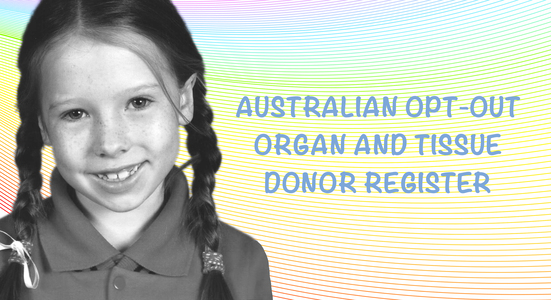2015-09-29 17:47:22 +1000
To: Minister for Health, Sussan Ley
Zaidee's organs and tissues saved lives – introduce an opt-out donor register

Dear Minister Sussan Ley,
Australia needs more Zaidees. We need an opt-out organ and tissue donor registration system.
My name is Allan and 10 years ago my family tragically lost our 7 year old daughter, Zaidee, to a cerebral aneurism.
Zaidee was the only child in Victoria under the age of 16 years and one of the youngest Australians to donate her organs and tissues. She was only 1 of 6 children nationally to have donated their organs that year.
As a family we had been registered as organ and tissue donors for 5 years. This decision, and Zaidee's wish to be a donor, meant that the lives of 7 people (6 children and 1 adult) were improved and in some cases saved by Zaidee's gift.
In 2004, the year we lost Zaidee, 130,000 Australians died, of which only 218 were organ donors. Zaidee’s gift of her organs allowed others to have another birthday. If people do not register as organ donors, 1 in 5 people on the transplant waiting list will never get the chance to have another birthday.
Currently Australians must opt-in to become a registered organ donor. This means that many people who intend to be donors either do not register before their death, or are unaware of the process. An opt-out system would increase the number of organ and tissue donations each year, reduce the number of people waiting for a transplant, and inspire every Australian to have a honest discussion about their wishes to be, or not be, a donor.
An opt-out system would save lives.
Australia needs more Zaidees. We need an opt-out organ and tissue donor registration system.
My name is Allan and 10 years ago my family tragically lost our 7 year old daughter, Zaidee, to a cerebral aneurism.
Zaidee was the only child in Victoria under the age of 16 years and one of the youngest Australians to donate her organs and tissues. She was only 1 of 6 children nationally to have donated their organs that year.
As a family we had been registered as organ and tissue donors for 5 years. This decision, and Zaidee's wish to be a donor, meant that the lives of 7 people (6 children and 1 adult) were improved and in some cases saved by Zaidee's gift.
In 2004, the year we lost Zaidee, 130,000 Australians died, of which only 218 were organ donors. Zaidee’s gift of her organs allowed others to have another birthday. If people do not register as organ donors, 1 in 5 people on the transplant waiting list will never get the chance to have another birthday.
Currently Australians must opt-in to become a registered organ donor. This means that many people who intend to be donors either do not register before their death, or are unaware of the process. An opt-out system would increase the number of organ and tissue donations each year, reduce the number of people waiting for a transplant, and inspire every Australian to have a honest discussion about their wishes to be, or not be, a donor.
An opt-out system would save lives.
Why is this important?
On any given day, there are at least 1,550 Australians waiting for a transplant, many of whom are children. Of the 150,000 Australians who die each year, less than 400 will donate solid organs, leaving at least 1,100 people still waiting for an organ transplant.
It is estimated that just under 1% of people that die in hospitals can potentially be an organ donor – that's approximately 75,000 potential organ and tissue donors per year.
Spain, the country with the world's highest rate of organ donation, has an opt-out system in place.
An opt-out system would not mean that all hospital deaths were automatically considered an organ or tissue donor. What it does mean is that everyone is considered a possible donor unless they, or their immediate family, remove them from the register.
An opt-out system is just one step towards saving lives, but it's an important one. Let's make this change now – for the 1,550 people waiting for a lifesaving organ donation, there's no time to waste.
It is estimated that just under 1% of people that die in hospitals can potentially be an organ donor – that's approximately 75,000 potential organ and tissue donors per year.
Spain, the country with the world's highest rate of organ donation, has an opt-out system in place.
An opt-out system would not mean that all hospital deaths were automatically considered an organ or tissue donor. What it does mean is that everyone is considered a possible donor unless they, or their immediate family, remove them from the register.
An opt-out system is just one step towards saving lives, but it's an important one. Let's make this change now – for the 1,550 people waiting for a lifesaving organ donation, there's no time to waste.
How it will be delivered
Our organisation, Zaidee's Rainbow Foundation, will deliver a copy of all signatures to the Health Minister, who has the power to implement this change.
